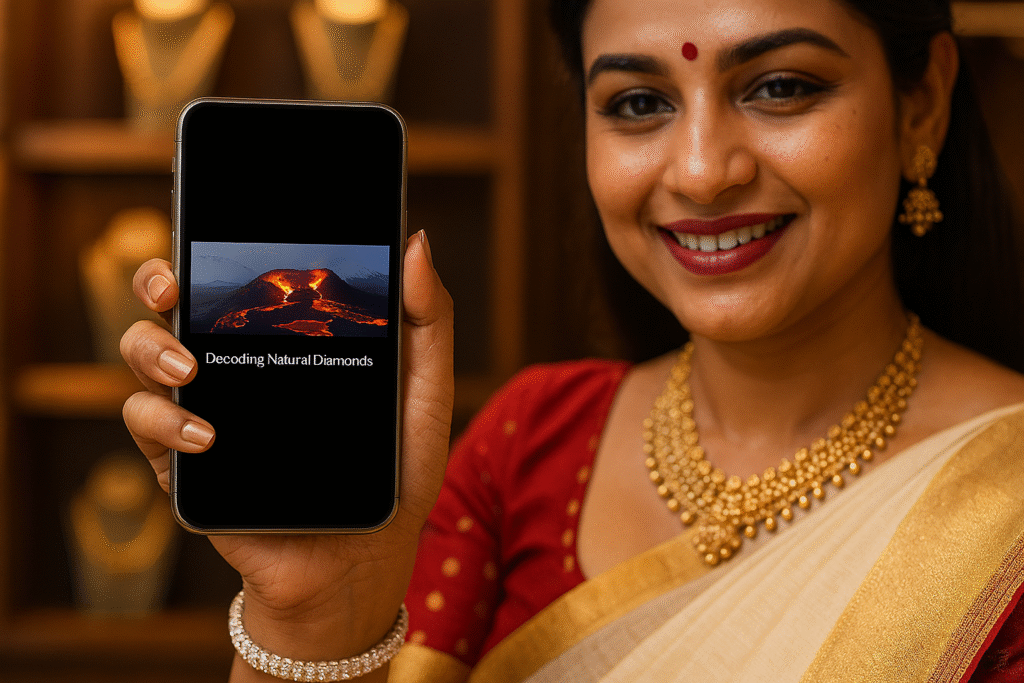Indian Natural Diamond Retailers Alliance and De Beers Partnership
The Indian Natural Diamond Retailers Alliance (INDRA) is helping jewelers across India grow, build trust, and educate consumers about natural diamonds. Partnering with De Beers and supported by the Gem & Jewellery Export Promotion Council (GJEPC), the alliance provides training, marketing support, and certification services to small and independent retailers. With India’s diamond market valued at $10 billion, this collaboration ensures that members of the Indian Natural Diamond Retailers Alliance remain competitive and credible in the growing diamond sector.
Why the Indian Natural Diamond Retailers Alliance Matters
India has long been a hub for diamond cutting and trading, but retail has often been fragmented. The Indian Natural Diamond Retailers Alliance provides:
- Training through the De Beers Institute of Diamonds
- Certification and grading services for natural diamonds
- Marketing campaigns like Forevermark
- Consumer awareness programs highlighting diamond quality and ethical sourcing
This initiative helps independent jewelers compete with large chains like Tanishq while increasing buyer confidence. Research shows over 70% of India’s diamond sales still come from small retailers.
See also: Understanding BIS Hallmark
Benefits for Retailers and Buyers
The Indian Natural Diamond Retailers Alliance ensures collective branding, knowledge sharing, and uniform quality standards. Members gain credibility, while buyers benefit from transparency, verified authenticity, and assurance of ethical sourcing. Awareness campaigns also highlight new diamond-buying occasions, including anniversaries, promotions, and self-purchases.
Read more at:
- De Beers Group
- Gem & Jewellery Export Promotion Council (GJEPC)
- Indian Natural Diamond Retailers Alliance
FAQ For the Indian Natural Diamond Retailers Alliance
Q: What is the Indian Natural Diamond Retailers Alliance?
A: A collaboration between De Beers, GJEPC, and small jewelers to promote natural diamonds and support retailers.
Q: How does it help smaller retailers?
A: By offering training, certification, marketing resources, and consumer awareness campaigns.
Q: Why is trust important in diamond buying?
A: Certified diamonds and informed buyers increase sales and confidence.
Q: Where can I learn more about diamond quality standards?
A: See Mistakes in Gemology for detailed guidance.
Introduction
This Responsible Travel FAQ provides comprehensive answers to help you make ethical tourism choices.
Our guide covers eco-friendly accommodations, local community support, sustainable transportation, cultural respect, wildlife ethics, and ways to reduce waste.
Following these practices ensures your adventures benefit both destinations and travelers.
What is Responsible Travel and Why Does It Matter?
Responsible travel means making conscious choices that minimize negative impact while maximizing benefits for local communities and the environment.
Tourism generates $1.4 trillion annually but produces 8% of global carbon emissions.
Your travel decisions affect local economies, cultural preservation, and environmental conservation.
How Do I Choose Sustainable Accommodations?
Look for eco-certifications such as:
- Green Key
- LEED building standards
- EarthCheck approval
- Rainforest Alliance verification
Check if hotels use renewable energy, water-saving systems, and source food locally.
Ask about waste reduction programs and community involvement. Calling properties directly helps verify claims.
Transportation Options for Responsible Travel
- Train travel emits 80% less carbon than flying for similar distances.
- Choose direct flights when necessary and book economy class.
- Use public transport, bicycles, or walk instead of renting cars.
- Consider verified carbon offsets for unavoidable flights.
Supporting Local Economies
- Buy from locally-owned businesses instead of chains.
- Book community-based tours with local guides.
- Eat at family-owned restaurants with local ingredients.
- Stay in homestays or boutique hotels rather than international chains.
- Purchase authentic handicrafts fairly from artisans.
Packing Tips for Responsible Travel
- Reusable water bottle with filtration
- Solid toiletries to reduce plastic
- Reef-safe mineral sunscreen
- Reusable shopping bags
- Bamboo or metal utensils
- Portable laundry soap
Pack light and choose durable, multipurpose items.
Respecting Local Cultures
- Learn cultural customs, dress codes, and etiquette.
- Learn basic local phrases.
- Dress appropriately for religious and conservative areas.
- Ask permission before photographing people.
- Participate respectfully in cultural activities.
Ethical Wildlife Encounters
- Maintain safe distances and avoid feeding animals.
- Choose conservation-focused sanctuaries, not entertainment attractions.
- Avoid elephant rides, direct contact, or photo opportunities with captive animals.
- Use certified naturalist guides who prioritize welfare and habitat protection.
Reducing Waste During Travel
- Use reusable containers, bags, and utensils.
- Refuse single-use plastics.
- Choose digital tickets and receipts.
- Carry a small trash bag where disposal is limited.
Questions to Ask Tour Operators
- Are staff local and fairly paid?
- How does your business give back to communities?
- What environmental practices are in place?
- Are group sizes limited to reduce pressure on sensitive areas?
- Are wildlife experiences ethical and conservation-focused?
Money and Overtourism Practices
- Use local ATMs and tip according to local customs.
- Support social enterprises and cooperatives.
- Visit during shoulder seasons, off-peak hours, or lesser-known areas.
- Stay longer in fewer destinations.
Responsible Travel on a Budget
- Cook using local market ingredients.
- Use public transportation.
- Stay in local hostels, guesthouses, or homestays.
- Explore free cultural events or walking tours.
- Exchange skills or volunteer for free accommodation.
Pre-Travel Research
- Learn about environmental challenges and cultural sensitivities.
- Check seasonal weather and political situations.
- Identify local organizations to support.
- Read destination-specific responsible travel guides.
Creating a Positive Impact Post-Travel
- Share authentic stories on social media.
- Write detailed reviews for responsible businesses.
- Continue supporting local organizations.
- Apply sustainable practices in daily life.
- Recommend responsible travel to others.
Learn more:



